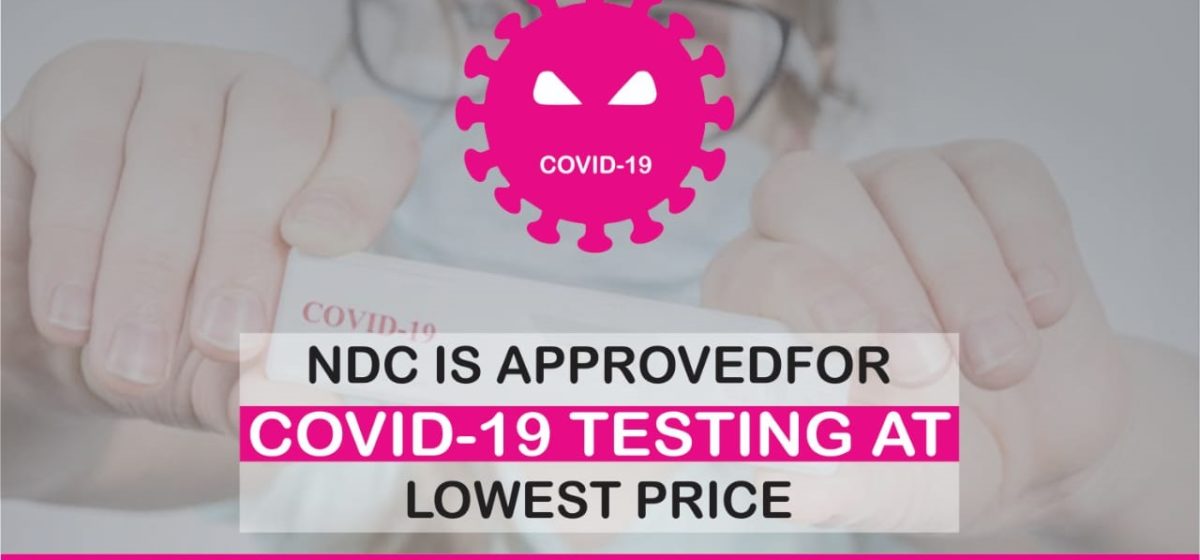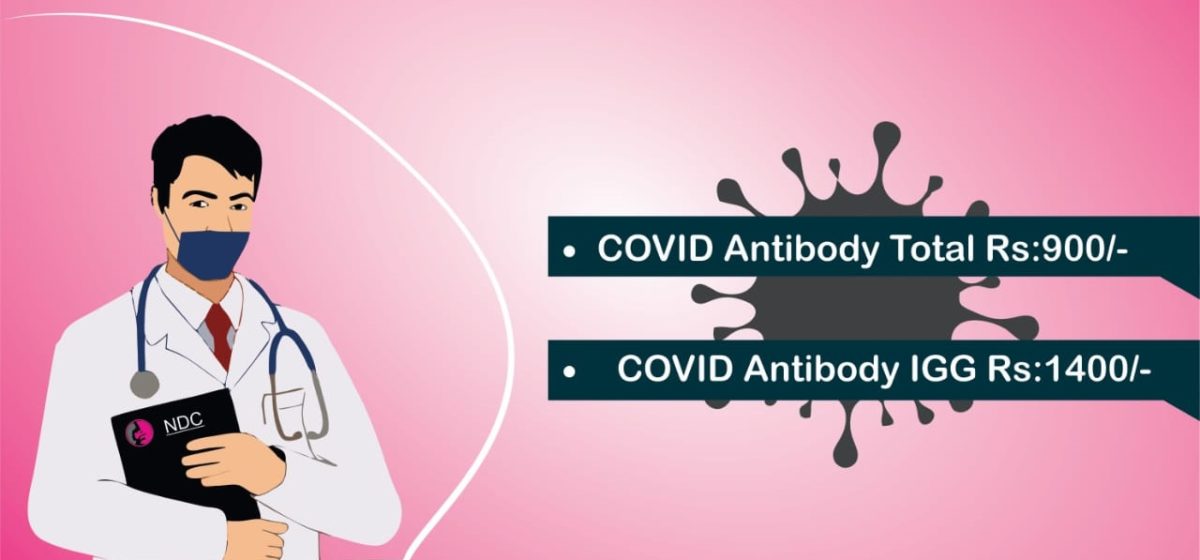Call us today 9311325337 to schedule an appointment now!
Overview

COVID-19 RT PCR Test Price : ₹ 1200/- only (Home Collection)

COVID-19 Antibody Total Test : ₹ 900/- only

COVID-19 Antibody IGG Test : ₹ 1400/- only
The ICMR Approved Two Types of Tests for Diagnosing COVID-19
Molecular Test : Also called a PCR test, this diagnostic test detects genetic material of the COVID-19 virus using a lab technique called polymerase chain reaction (PCR). A health care worker collects fluid from a nasal or throat swab or, less often, from saliva. Results may be available in 24-48 hours. Molecular tests are considered very accurate when properly performed by a health care professional, but the rapid test appears to MISS MANY INFECTIONS.
Antigen Test : This diagnostic test rapidly detects certain proteins that are part of the COVID-19 virus. Using a nasal or throat swab to get sample fluid, antigen tests can produce results in minutes. Because these tests are faster and less expensive than molecular tests are, some experts consider antigen tests more practical to use for large numbers of people. A positive antigen test result is considered very accurate, but there’s a high chance of false-negative results. So antigen tests aren’t as sensitive as molecular tests are. Depending on the situation, your doctor may recommend a molecular test to confirm a negative antigen test result.
The availability of COVID-19 diagnostic testing and where to get tested may vary depending on where you live and the recommendations of your local public health officials.
Why it's Done ?
Your doctor may recommend a COVID-19 diagnostic test if :
- You have COVID-19 symptoms, such as fever, cough, tiredness or shortness of breath
- You’ve had close contact with someone who tests positive for the COVID-19 virus or is suspected of having the virus
- You’re at high risk of complications if you become infected
Certain groups are considered high priority for diagnostic testing. These include people with COVID-19 signs and symptoms who:
- Work in a health care facility or as first responders
- Live or work in long-term care facilities, such as nursing homes, or other places where people are housed closely together, such as prisons or shelters
- Are being cared for in a hospital
Other people may be given priority for testing depending on local health department guidelines for monitoring COVID-19 in individual communities.
Some people who are infected with the COVID-19 virus may be asymptomatic, meaning they don’t have any signs or symptoms. But they can still transmit the virus to others. As more COVID-19 tests become available, in some areas of the country testing is being expanded to include asymptomatic people. If people without symptoms have a positive test result, they should follow guidelines for self-isolation to help curb the spread of the virus.
We have been awarded prestigious NABL Accreditation, the highest level of accreditation for clinical laboratories in India, for compliance to ISO 15189:2012 by National Accreditation Board for Testing and Calibration laboratories.
Risks
There’s a chance that your COVID-19 diagnostic test could return a false-negative result. This means that the test didn’t detect the COVID-19 virus, even though you actually are infected with it. You risk unknowingly spreading the virus to others if you don’t take proper precautions, such as following social distancing guidelines and wearing a face mask when appropriate.
The risk of false-negative test results depends on the type and sensitivity of the COVID-19 diagnostic test, thoroughness of the sample collection, and accuracy of the lab analysis.
What you can expect ?
For a COVID-19 diagnostic test, you provide a sample of mucus from your nose or throat, or a sample of saliva. The sample needed for diagnostic testing may be collected at your doctor’s office, a health care facility or a drive-up testing center.
Nose or throat swab. Your doctor or other health care professional inserts a thin, flexible stick with cotton at the tip into your nose or brushes the swab along the back of your throat to collect a sample of mucus. This may be somewhat uncomfortable. For the nasal sample, swabbing may occur in both nostrils to collect enough mucus for the test. The swab remains in place briefly before being gently rotated as it’s pulled out. The sample gets sealed in a tube and sent to a lab for analysis.
Saliva sample.Though not considered the best way to get a good sample, a saliva test may be done if discomfort is an issue with a nose or throat swab. You spit into a tube several times to provide a sample of your saliva to test. The tube is sealed before being sent to a lab for analysis.
If you have a productive cough, your doctor may collect a sputum sample, which contains secretions from the lungs, a part of the lower respiratory system. The virus is more concentrated in the nose and throat early in the course of the infection. But after more than five days of symptoms, the virus tends to be more concentrated in the lower respiratory system.
In addition to the COVID-19 diagnostic test, your doctor may also test for other respiratory conditions, such as influenza, that have similar symptoms and could explain your illness.
Results
Some facilities have rapid tests for COVID-19 diagnostic testing. In that case, you may get your results on the same or next day that you’re tested.
Your COVID-19 diagnostic test result could be positive or negative.
Positive Result: This means you currently have an active infection with the virus that causes COVID-19. Take appropriate steps to care for yourself and avoid spreading the virus to others. Self-isolate until you meet all three of these conditions: Your symptoms have improved, and it’s been three days since you’ve had a fever, and at least 10 days have passed since your symptoms first appeared. Some people, such as those with health conditions that lower their ability to fight disease (immunity), may need to stay in isolation longer, so follow your doctor’s advice.
Negative Result: This means that you likely weren’t infected with the COVID-19 virus. But a false-negative test result could happen depending on the timing and quality of the test sample. Even if you test negative, you could become infected in the future, so it’s important to follow guidelines for social distancing, face mask use and hand-washing to avoid potential spread. Your doctor may recommend repeat testing if you continue to have symptoms.
Contact Tracing
If you test positive for the COVID-19 virus — or your doctor suspects that you have the virus but you don’t have test results yet — you may be asked to participate in contact tracing. Contact tracing plays a key role in limiting the spread of infectious diseases. The sooner contact tracing starts, the more effective it is in limiting virus spread.
To begin, you provide a list of people you had close contact with during the time you may have been contagious. Public health workers then get in touch with those close contacts to let them know about the exposure and their potential for being infected. Your identity is protected during this exchange of information.
The contact tracing team provides information on what close contacts can do to minimize the risk of spreading the virus. Steps may include getting a COVID-19 test, staying at home in quarantine for 14 days after the exposure, learning about signs and symptoms, and taking other precautions.
COVID-19 (SARS-CoV-2) IgG Antibody
Molecular testing (PCR Swab) will identify people with the virus. Antibody testing can tell whether a person has been previously infected. Most patients who recover from coronavirus have been found to produce antibodies, but it is not yet known if an individual with a positive result showing presence of IgG levels following being infected with SARS-CoV-2 will be protected, either fully or partially from future infection, or for how long protective immunity may last.
Testing should be undertaken 14 days or more following exposure or onset of symptoms. The incubation period of COVID-19 ranges from between 1 to 14 days, with the majority of cases manifesting with symptoms at 3 – 5 days. The most common symptoms of COVID-19 are fever, tiredness, dry cough and difficulty breathing. These symptoms have the potential to develop into a very severe acute


